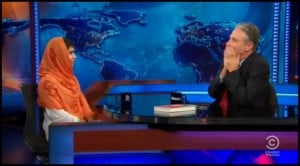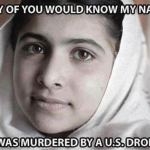Editor’s note: Malala Yousafzai has been extensively covered in media lately, and several MMW writers wanted to weigh in on the way she is being portrayed. Yesterday, Amina wrote about portrayals of Malala as an exception, and today Nicole Hunter Mostafa looks at the focus on Malala being a child. Stay tuned for a final Malala post by Eren later this week.
Are you tired of hearing about Malala Yousafzai yet? If you type “Malala is” into Google (at least, here in Saudi Arabia), the first three search suggestions that pop up are “Malala is annoying,” “Malala is fake,” and “Malala is drama.” If you are a person making one of those Google searches, the Internet has probably not been an inviting place for you in the past few weeks. Regardless of how one feels about the Malala saga, the truth is that nowadays, it’s Malala’s world, and we just live in it.
In all honesty, I’ve personally been quite torn on the subject of the Malala media frenzy, which MMW’s Merium wrote about last year. On one hand, Malala is obviously an exceptional young woman who undoubtedly deserves every activist accolade being heaped upon her. I would be honored to meet her, to sit down with her, and talk about her vision for the future of the world.
On the other hand, as Emaan wrote about here on MMW earlier this year, Malala fits into the preferred Western media narrative about Muslim women, one in which Muslim women are acknowledged as brave, powerful, and strong only when their exhibition of those qualities support the idea that, in Emaan’s words, “controversial U.S. military actions are a necessary sacrifice in order to save girls like Malala.”
Regardless of what made Malala’s particular story resonate with the consumers of Western media, I think she’s fantastic, and my admiration of her rose even more when she met with President Obama this week and, according to a statement that she released after the meeting, informed him that his drone policy was “fueling terrorism”—i.e., inadvertently supporting the groups that want to attack Malala and girls like her.
I was impressed by this revelation, because the statement released by the White House touted President Obama’s meeting with Malala but made no mention of her recommendation on his administration’s drone policy. Malala obviously knows that there are many more like her who never got their chance to make their voices heard, and by releasing a statement that acknowledges that the Taliban is not the only existing threat to precocious Pakistani schoolgirls, it seems she is taking a step toward wresting control of her media narrative.

Her statement is also, in my view, a step toward confronting the infantilization of Malala in the media. In comparison to how Malala’s story is covered when compared to those of other prominent young women, let’s look at the musician whose song is currently number one on the Billboard Hot 100 chart is. Her (stage) name is Lorde, she’s from New Zealand, and she’s Malala’s age. Last week, a mild scandal arose over an accusation by a blogger that her song, “Royals,” was racist. In the resulting media coverage, the fact that Lorde was 16 was a side note; the fact that she’s the youngest person to top the Billboard chart in over two decades was a bit of trivia tossed into the story. Much ado was not made about the talent Lorde displays at such a young age. No one crows about wanting to adopt Lorde, as Jon Stewart did when Malala appeared as a guest on his show. Don’t get me wrong; I love me some Jon Stewart, and admittedly, a young person so eloquently channeling Gandhi could be considered a bit more impressive than a young person penning a catchy—if profound—pop song. But Lorde was—and is—recognized as a great talent on the cusp of adulthood. Words like “musician” and “artist” are used to describe Lorde, without referring to her youth.
But with Malala, the scene is different. Everywhere we turn, we are reminded that she is young. She may get the title of “activist” ascribed to her, as well, but she is always a schoolgirl. And I realize that this is not entirely inappropriate, given that education is the focus of her activism. But why is Malala treated like a child in the media, while other prominent young women her age are not—or at least, not to the same degree? Obviously, Malala and girls like her do need protection in some fundamental way; otherwise, she wouldn’t have been shot. But is it necessary to continually reinforce that she is a child? “A child role model of astonishing fortitude” (as Qanta Ahmed described her), but a child nonetheless?
When will Malala get to be a grown-up, with her own agency? Reducing Malala to a child at every turn ultimately helps to infantilize Muslim women as a whole. Lorde, who began working with record companies at the age of 12 and was thus writing and recording songs at the same time Malala was blogging for the BBC, gets to be recognized an adult at 16, but Malala does not. It seems that the prevailing media narrative is intent on holding Malala exactly where the Taliban would have had her—as a perpetual child. Will she get to be a grown-up?
And if we do recognize her as an adult as some point, will we care about what she has to say when she’s not a precocious youngster, but a grown Muslim woman using the platform she’s been given to make her own ideas heard, some of which may not fit with the quotable sound bite philosophy that the media want to ascribe to her—like the idea that our President’s policies just might be at least partly responsible for what happened to her? I have to wonder if part of the reason that the media want to see Malala as a child is because if she makes these steps outside of the narrative they want to attach to her, they can give her a figurative pat on the head and chalk it up to youthful misjudgment…coupled with the conviction that women and girls like Malala don’t really know what’s best for themselves.
I find it frustrating that so many are less willing to focus on the value of what Malala has to say than on how old she is when she says it. After all, anyone who gives a speech like this deserves to be recognized as an activist, without qualifiers.












